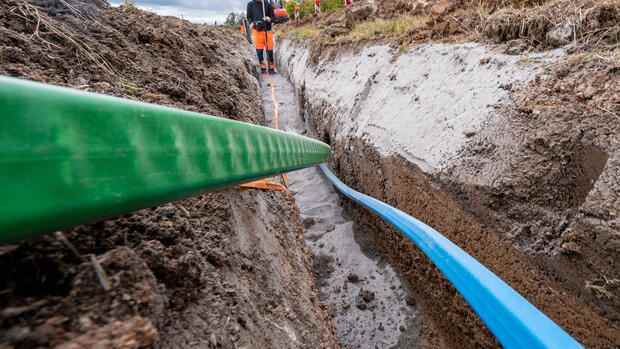The bidding process for a fiber optic joint venture in Austria is to begin next year.
(Photo: dpa)
Dusseldorf Deutsche Telekom is preparing partnerships with investors in several EU countries in order to share the costs for the fiber-optic expansion. In Austria, among other places, a joint venture is being prepared in which Telekom and a partner will each contribute 150 million euros, the Handelsblatt learned from both financial and corporate circles.
Including debts, the joint venture could be valued at around one billion euros. A bidding process is to begin at the beginning of next year. A similar approach is planned in Poland. A company spokesman declined to comment.
With this, Telekom is making a fundamental change in strategy. The stock corporation emerged from a former German state-owned company and had controlled the infrastructure on its home market from the start. Now, Telekom is increasingly moving away from this goal, both in Germany and in its European national companies.
The main reason for the realignment is the high level of debt in the group. With more than 130 billion euros in net financial debt, the debt level is higher than ever.
Top jobs of the day
Find the best jobs now and
be notified by email.
At the presentation of the figures for the third quarter, CFO Christian Illek had to admit that Telekom has missed its self-set target for the debt ratio and will probably miss it for years to come.
Telekom is struggling with high debts
In terms of relative debt, the group is not doing well. The ratio of net financial liabilities including leasing liabilities to adjusted Ebitda was 3.02 at the end of September. From this it can be calculated that if the earnings situation remained the same, it would take Deutsche Telekom three years to repay its outstanding debts.
Illek announced that he would not be able to meet the target corridor again for three years. “Our goal is still to bring this ratio back into the comfort zone of 2.25 to 2.75 by the end of 2024 at the latest,” said the Telekom chief financial officer.
At the same time, the group has to modernize its infrastructure. In Germany and other countries in Europe, Telekom often relied on old copper networks for broadband, but these only offer speeds of up to 250 megabits per second. Today, fiber optics can already do fourfold, and new fiber optic technologies can enable even higher transmission rates.
The partnership with external investors is a way to cope with the expansion without having to bear all the costs yourself. According to insiders, preparations in Austria are well advanced. In Poland, however, the plans are still in their infancy.
Telekom also wants to sell broadband to wireless customers
At the end of September, Telekom had a total of around 7.1 million broadband customers in Europe. Compared to the 46 million mobile phone customers, this number is low. The declared goal of Telekom is to be able to offer broadband contracts to as many mobile phone customers as possible.
So-called bundled offers are seen in the industry as a good way to retain customers and to develop new customer groups. In Austria there are just 655,000 broadband customers for every 5.1 million mobile phone customers. In Poland the ratio is as much as 11.4 million mobile customers to 67,000 broadband customers.
The model for the partnership in the European national companies is Germany. At the beginning of September, Telekom entered into a joint venture with the Australian infrastructure investor IFM in order to share the costs of fiber optic expansion for four million households in Germany. The joint venture is called “GlasfaserPlus”.
CEO Timotheus Höttges said: “GlasfaserPlus shows that we are breaking new ground in order to quickly mobilize the funds for network expansion. We have been pushing the limit with our own investments for years. We are expanding as much as we can. “
Telekom plans to develop households in rural areas in almost all federal states as part of the project. In Hesse there are to be 870,000 households, in Bavaria 750,000, in Rhineland-Palatinate 670,000, in Thuringia 460,000 and in Brandenburg 420,000 households. The rest is spread over several federal states from Saarland to Mecklenburg-Western Pomerania.
Telekom is taking a similar path to its competitor Telefónica, which has teamed up with the insurance group Allianz to expand its network in Germany.
More: Fiber optic expansion: Telekom concludes deal with infrastructure investor IFM.
